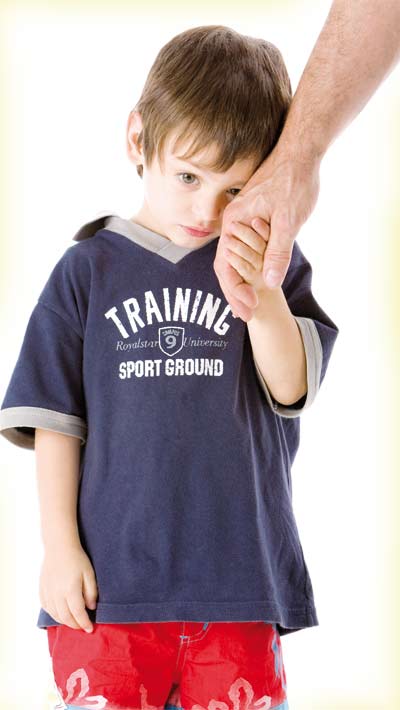Man is continuously engaged in an inner struggle between who, what and where he is in his life, and who, what and where he should/must/ought to be. When the discrepancy between the reality of who he is and who he should be is too vast, it precipitates an inner crisis. This inner crisis is caused by self-defeating ideas and beliefs that an individual has ‘bought’ from the outside.
Neurotic beliefs
As children we acquire our values, beliefs and attitudes from significant adults in our lives, especially from parents. And often parents sell these beliefs as a form of control, with the good intention of saving the child from some harm. Too often, however, the opposite happens. These faulty values and beliefs make us uptight, afraid of criticism and rejection, overanxious about approval and disapproval, prone to feelings of guilt, and obsessed with polar opposites such as ‘success’ and ‘failure’. If these beliefs are the guiding principles of our life, we will continue to feel like failures, no matter what Herculean efforts we take to pursue and apply them. Such mistaken beliefs can make just about anyone neurotic.
Some neurotic beliefs sold by families are:
- You should make sure that you please others and they like and approve of you.
- You should feel guilty if you do your own thing and it upsets others.
- You must be perfect at all times.
- You are inferior, if you make mistakes.
- If you are different, there must be something wrong with you.
- You must be loved and respected by everybody.
- People should be condemned for their misdeeds.
This need of approval from families is the main cause of turning absolutely normal people into neurotics
Two cases in point
Jayant was the only son of an authoritarian father and a submissive mother. He grew up hearing the mother constantly harp on how much she had to tolerate her husband’s idiosyncrasies. She said she was in the marriage only because of Jayant, who, she claimed, was her only hope. The young child grew up to be an adult plagued with guilt feelings and an excessive need to please the mother. After his marriage, Jayant was estranged from his wife because of his need to please his mother at all times. He felt he had to make up for the ‘sacrifices’ his mother had made for him. With his father, Jayant had a relationship of fear and hatred as his father was a monster, according to his mother. He felt helpless against his father, who held the purse strings. So, Jayant was always in an inner conflict, torn between his inner convictions and desires on the one hand, and on the other, the unreasonable guilt and anxiety arising from his actions that would displease his mother. A rising conflict level with his wife brought him to us for counselling.
In counselling, Jayant learned to acknowledge that the dysfunctions of his family led to the neurotic anxiety, unnecessary guilt and uncontrollable anger in him. He also understood the dynamics in his family and that he had a choice to consciously disengage from his past.
Sudhir’s father was a leading industrialist—a man who prided himself on being ‘self-made’. Sudhir himself was academically brilliant and would bring home medals and scholarships—only to be told by his father that his achievements were nothing, and that he need not feel so proud. Of course, Sudhir’s face would fall when his achievements, far from being acknowledged and praised, were seen as making him arrogant. Striving as hard as he may, his father’s responses never changed. Sudhir started feeling that he was never good enough for his father. All throughout, everyone in his school and college would shower him with praise, but his father would snub him and maintain a stoic expression, justifying his actions by saying he was teaching his son humility.
The last straw came one day when Sudhir took the family car for a party thrown in his honour. On his return, the father publicly caned him in the car park, saying that a few certificates did not give him the liberty to use the car, and that whatever he enjoyed today was due to the hard work of the father and not Sudhir’s own achievements. Smarting with humiliation, Sudhir slashed his wrist. On return from the hospital, he was condemned once more by his father—this time for bringing shame to the family name. Today, Sudhir, a genius-turned-neurotic, is under psychiatric care, whimpers like a child on seeing his father’s face, cannot hold on to a job, and is obsessed with becoming a millionaire to ‘show Papa’. He continues to express his need for the father’s approval, which he does not receive even today.
What constitutes a functional family
A family unit is a unique collection of individuals, which in its ‘healthy’ form provides a sense of being cared for, nurtured, loved and accepted unconditionally, a sense of belonging, closeness, safety and security. It is a forum for free, frank and uninhibited self-expression. Family provides the freedom and encouragement to be oneself in a space of trust and respect. It is not only your soft place to fall back on when you feel vulnerable at times, but also a space where you receive caring and constructive feedback, which is purely in the interest of your personal growth. It has absolutely no agenda to control, manipulate, or get you to conform to the whims of any one member. In other words, your freedom of choice is acknowledged and respected.
A functional family instead of binding its members and limiting their growth, communicates fully the unconditional support that nurtures each member to actualise oneself.
The family begins with you and the way you relate with yourself, because the way you relate with yourself is the way you will relate with the other. To provide a loving environment to another, you will have to first provide it to yourself. Think about it. Would you hire someone who had flunked in math to tutor your child in math? The point is that we can help our children lead fulfilling lives only if we have achieved our own individual levels of proficiency in leading fulfilling and meaningful lives of unconditional self-love and self-acceptance.
Self-loving people create a loving partnership, which creates loving families, which in turn, create loving communities, loving nations and thus a loving world.
Need for approval
 This need of approval from families is the main cause of turning absolutely normal people into neurotics. When approval-seeking becomes a dire need, and your ‘self’ is sacrificed for the opinions and predilections of others, you start self-destructing, and are heading for a great deal of misery in your life. You could find yourself feeling extremely depressed, unworthy, guilty and anxious because a significant person has disapproved of you.
This need of approval from families is the main cause of turning absolutely normal people into neurotics. When approval-seeking becomes a dire need, and your ‘self’ is sacrificed for the opinions and predilections of others, you start self-destructing, and are heading for a great deal of misery in your life. You could find yourself feeling extremely depressed, unworthy, guilty and anxious because a significant person has disapproved of you.
Because of this approval-seeking need in you, families can manipulate you. Any effort you make on your part to break away from this need—by becoming independent of others’ opinions—is labelled as being selfish, uncaring, inconsiderate, and arrogant. This vicious circle of manipulation continues in many families.
Unconditional love and approval is the one thing that every man, woman or child looks for throughout his life, and this unfulfilled intrinsic need is the sole cause of all human misery and neurosis.
All children need unconditional love and acceptance from their parents in their formative years. If they do not receive it, the neurotic seeds of self-doubt are planted. When children do not fit the job description laid out for them by the parents—by speaking out their own mind, thinking for themselves and wanting to create their own path in life—many parents withdraw their love. Such parents tend to treat children like possessions who will be nurtured only if the children are who and what the parents want them to be.
Kahlil Gibran speaks to parents about this in The Prophet.
“Your children are not your children. They are the sons and daughters of Life’s longing for itself.
They come through you but not from you, And though they are with you yet they belong not to you,” he writes.
Athletic Sanjana wanted to be a fitness instructor, but her highly qualified parents wanted her to be a doctor or an engineer. Her need of approval made her enrol into medical college with her father paying a hefty donation for the admission. She failed twice in the first term and realised that she was just not cut out for this. However, compelled by her need for parental approval, she bought the question papers for a large sum, which she acquired by stealing jewellery from her relatives and friends. She gradually became a confirmed kleptomaniac. She was arrested one day and on being bailed out by her father, was given the cold shoulder treatment at home. She acquired her degree in the same way and was so depressed with the lack of love and acceptance that she got into a bad and violent marriage with the boy who had helped her acquire the question papers.
In counselling, she was helped to break free from an abusive marriage and to free herself from this ‘dire need of approval’. Today, she is a fitness instructor in a local gym and arranges treks for the youth during weekends. She has returned to herself her self-worth by not allowing herself and her life to be defined by coloured opinions of others.
Need for unconditional love

When a child is born, she receives physical nurturing from the parents, but remains malnourished and unfulfilled in her deepest core. She spends her entire life seeking a sense of fulfilment, satisfaction, contentment, completion and wholeness to appease her intrinsic hunger for unconditional love.
Such a child tries appeasing her hunger by amassing wealth, by creating a social group and surrounding herself with people, by achieving prestigious positions of power in society, by getting awards, by climbing the Everest, by indulging indiscriminately in food and sex, alcohol and drugs, etc. In short, she is constantly trying to compensate her intrinsic hunger of unconditional love.
All social evils arise out of this very hunger. Competitiveness, murders, war, addictions, sexual abuse, prostitution, obesity and other indulgence-created diseases are a result of this unappeased hunger.
On a more personal level, we see the same hunger ruining relationships too. A man and a woman, who never received unconditional love from their parents during their formative years, come together in an intimate relationship with the same mindset—hungry for unconditional love—almost like two beggars begging from each other, neurotically insisting that the other appease his/her hunger.
Is it any wonder then, that marital conflicts, depression, suicides, murders, divorces are on the rise?
Erich Fromm writes in the Art of Loving, “Unconditional love corresponds to one of the deepest longings not only of a child but of every human being; on the other hand, to be loved because of one’s merit, because one deserves it, always leaves doubt; maybe I did not please the person whom I want to love me, maybe this, or that—there is always a fear that love could disappear.
“Furthermore, ‘deserved’ love easily leaves a bitter feeling that one is not loved for oneself, that one is loved only because one pleases, that one is, in the last analysis, not loved at all but used”.
“Don’t lie to your child”
-Osho
Spiritual master Osho spent his early childhood with his maternal grandparents. Even in his childhood, he was radically different—and so were his questions. Once he asked his grandmother what religion she belonged to. Her honest reply, that she didn’t belong to any religion, touched his innocent heart. He felt she was a great woman, because she was unable to lie to a child.
Osho said, “Nobody should lie—to a child, at least, it is unforgivable. Children have been exploited for centuries just because they are willing to trust. You can lie to them very easily and they will trust you. If you are a father, a mother, they will think you are bound to be true. That’s how the whole of humanity lives in corruption, in a very slippery, thick mud of lies told to children for centuries. If we can do just one thing, a simple thing—not lie to children and to confess to them our ignorance—then we will be religious and we will put them on the path of religion. Children are only innocence; leave them not your so-called knowledge. But you yourself must first be innocent, unlying, true.”
Finding self-love
Children of parents who give only conditional love need to work at making themselves un-neurotic in spite of their families. Breaking away from this need of approval and establishing themselves in self-love is the only way. Psychologically mature people do not seek a stamp of approval from significant people as they love themselves and accept themselves in totality.
It is also no coincidence that so many people turn to religion and spirituality. The need for this unconditional parental love and acceptance is visible through the belief in a ‘Divine Father’ or a ‘Divine Mother’ in heaven—the heavenly parent, who showers infinite unconditional love and acceptance on his/her children.
But, this need for fulfilment finds completion only when man turns to the infinite source of self-love, his own higher self, and finds nourishment for his impoverished and starved soul. Such a healed person finds healing in understanding that those he seeks unconditional love from, are themselves seeking the same, and thus are incapable of providing what he seeks. On connecting to the infinite and inexhaustible source of his higher self, he not only fills his own heart, but now becomes capable of nurturing other hungry hearts that come into his life. Such a person grows from being a needy and neurotic child, to being a un-neurotic fulfilled adult, thus reaching psychological maturity.
Soliloquy of a grateful son
— By Aman Bhonsle

Family, as I define it
In my opinion, a family is one’s primary social group and the interface that nurtures, protects, shelters, loves and provides for an individual. For me, my family has been the blood borne connection I share with my parents in wholly representing the values I stand for, such as honesty, responsibility for actions, coherence, listening intently to the opinions of others and constructive communication.
My family is what I represent and they are my honest critics, companions and the truth serums of my existence. They complete my perception of the world and help me gain an insight into myself and into the world around me. I love, respect and stand in awe of my family, without whom I feel incomplete.
The role of my family
I am a person who always defied convention and dared to dream against all opposition. I have always had the need to go with the flow in an untamed way in keeping with my wildly adventurous urges.
My family has supported my struggle to find a role for myself—not only in the educational institution dynamic, but also in the extended family dynamic. I was never academically gifted, nor were my sporting abilities much to boast about. This led me to search deep into what is it that fulfils and completes me. I found expression in playing the digital keyboard, sketching, writing and working with cameras. It also gave me immense joy to listen to, learn from, and narrate human stories through the audio-visual medium. My family has stood by me through it all, which has encouraged me to be a creative rebel with a cause.
In my family, we can have a healthy difference in opinions, where each individual has a right to his expectations and desires, and where a consensus may not necessarily be reached by virtue of a certain gender, age or familial role/context.
My family is my primary group, where I was nurtured and supported physically and psychologically, and encouraged to be the best at what I love to do. In short, I was allowed to be myself. My family taught me the meaning of taking responsibility for all my actions and to learn to follow my conscience when in doubt. My parents have always given my opinions, thoughts, ideas and perspectives the autonomy, respect and credence that they deserve. This egalitarian environment supports my faith in being able to challenge my weaknesses and turn every obstacle into a stepping stone to achievement. My family infused in me an optimism that helped me become a confident and composed individual.
Specific contributions
When my friends make references to issues of parental pressures, I always remember my mother’s ‘we can agree to disagree’ statement and suddenly wonder if I’ve ever been pressurised by my parents.
By allowing a healthy difference of opinions, by being reasonable and non-judgemental, and by accepting me for who I am [and for who I am not] my mother has both sheltered and bolstered my volatile and sensitive mind.
I have seen that I work optimistically and tirelessly towards my film-making and all that I’m passionate and fuelled about. This has been how my mother lives, and I have probably unconsciously imbibed this over time.
My father once said, ‘You either do it or you don’t…there’s no such thing as trying to’, and my mother said, ‘Courage is in doing it afraid’, and this has encouraged me to meet every challenge that has come my way so far.
Through numerous conversations with my parents, I have been systematically helped to understand and accept the phenomenon of being human, so that I can make sense of everything that happens within me and around me.
This has helped a boy to turn into a man who can observe and absorb different aspects of the world. It has something to do with his mother showing him what it means to listen, and his father showing him to let time take care of some things.
I am therefore a product of my mother’s unconditional love and teachings and knowledge, and my father’s pragmatism, worldly wisdom and rock-solid support.
Aman Bhonsle is the 20-year old son of Dr Rajan & Minnu Bhonsle.
The original sin
 If theirs is an original sin, it is when couples have children for the wrong reasons. Here are some of the absurd reasons to have a baby and suggested alternatives
If theirs is an original sin, it is when couples have children for the wrong reasons. Here are some of the absurd reasons to have a baby and suggested alternatives
- To fulfil the parent’s need of a soft, warm, cuddly feeling in their arms.
Get a soft cuddly pillow or toy instead. - To fulfil the parent’s need of being surrounded by people to avoid loneliness.
Get a club membership, or better still, become a member of a social organisation or your local religious outfit. - To fulfil the male parent’s need of proving that he is man enough.
Get into wrestling or any other macho sport to prove your maleness. - To fulfil the parents’ need to provide entertainment to their older child.
Get the child a video game or send her to summer camp. - To fulfil the parent’s need to play the provider.
Provide for the street children or the orphanages around you. - To fulfil the parents’ need to have someone in their life who will love them.
Here, you yourself are seeking a parent. Get yourself a pet dog instead, who will loyally wag his tail on seeing you. - To fulfil the parent’s need for the continuity of the family name.
Set up a charitable trust in the family name to ensure the continuity of the name. - To fulfil the parents’ need to be looked after in old age.
Get hired help or enrol yourself in a senior citizen’s home of your own choice. - To fulfil the parent’s need of making their marital relationship stronger.
Seek marriage counselling instead. - To fulfil the ambitions of parents.
Read a motivational do-it-yourself book, and go build the life of your dreams.
Thus, the child is born with an agenda laid out for him. She is not loved and accepted for who and what she is, but is burdened with a lifelong task of fulfilling the conditions attached to her birth. So begins the human saga of misery.
The child can feel intuitively that the nurturing that she is receiving from her parents is conditional, and that she was not conceived and wanted for herself but for what she represented in her parents’ minds.
This intuitive feeling becomes a reality when the child is coaxed and compelled to fit into a predetermined image decided by the parents. She senses that there are conditions attached to the parental love, and that this love can be withdrawn if the conditions are not fulfilled, thus threatening her security.
This becomes glaringly clear when she tries to assert her individuality from time to time, especially during adolescence. This is when she realises that whenever she does not fulfil the parental need, love and acceptance is withdrawn, and this is the period when interpersonal conflicts between parents and teenagers begin.
 Spot an error in this article? A typo maybe? Or an incorrect source? Let us know!
Spot an error in this article? A typo maybe? Or an incorrect source? Let us know!
